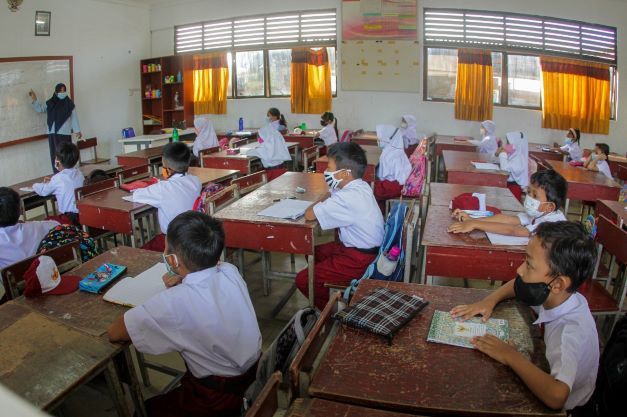Popular Reads
Top Results
Can't find what you're looking for?
View all search resultsPopular Reads
Top Results
Can't find what you're looking for?
View all search resultsHepatitis should not stop in-class learning, but caution needed: Experts
Health Ministry reports one probable case.
Change text size
Gift Premium Articles
to Anyone
E
ducators and health experts say that in-classroom learning should continue despite recent discoveries of a poorly understood form of child hepatitis, but they have urged parents and the government to keep close watch over health and hygiene protocols.
As of last week, the Health Ministry had investigated 27 cases thought to be connected to the mysterious illness, but only one had been classified as a probable case based on criteria set out by the World Health Organization (WHO).
Acute hepatitis of unknown origin, as the condition is known, has been ruled out in thirteen cases, and the remaining 13 are pending classification.
As of May 10, 436 cases had been reported in 27 countries – mostly in the United Kingdom and the United States – and 11 fatalities had been recorded.
Read also: Govt probes another hepatitis-linked child death as more cases emerge
Despite this, epidemiologist Dicky Budiman of Austrialia’s Griffith University said on Thursday that in-person learning would be relatively safe for students in elementary school or older, particularly because a large number of illness thought to be related to the mysterious form of hepatitis were in children younger than 5.
However, Dicky urged parents to take precautions to ensure their children were maintaining personal health and hygiene and adhering to health protocols in the classroom. This, Dicky said, included regularly washing their hands, routine physical exercise and a proper diet.
“Children are ultimately the parent’s responsibility, so parents’ attitudes and views toward health protocols will matter a great deal for the [health] of their children” he added.
Public health expert Tjandra Yoga Aditama said on Wednesday that because not much was yet known about the illness, schools could not afford to stop in-person learning, but he added that the government should watch the situation carefully.
Educators also say that in-person learning should continue but with strengthened government oversight of health protocols.
“We still need to be alert and cautious. Despite the easing of restrictions, the COVID-19 pandemic is not over, and now we have the hepatitis [cases],” said Satriwan Salim, national coordinator of the Association for Education and Teachers (P2G).
Satriwan said the P2G had received reports that schools were becoming less disciplined with health protocols and that there was less monitoring by local education agencies and health authorities.
“The government needs to do more to stop hepatitis from spreading and forcing schools to go back to online learning, particularly since the past two years [of online learning] have proven to be problematic,” he added.
Read also: Prolonged school closure puts students’ future earnings at risk: WB study
Precautions
The Health Ministry has called on school infirmary personnel to keep an eye out for symptoms related to both COVID-19 and acute hepatitis.
The ministry is also planning to issue a circular to regional health agencies to boost health and hygiene advocacy campaigns at schools under their jurisdiction.
According to Health Ministry spokeswoman Siti Nadia Tarmizi, the ministry and the Education, Culture, Research and Technology Ministry will also issue a circular to educational institutions providing technical guidance on hepatitis risk management.
Hepatitis B vaccines will be made available to children above 1 year old. The vaccine was previously only available for children under that age.
“School-age children who did not get the vaccine need to be brought to local health facilities to get it,” Nadia said on Thursday, as quoted by Kompas.
The government has continued easing COVID-19 restrictions at schools, saying that existing health protocols, detailed in a joint decree, will be enough to prevent a hepatitis outbreak.
Jumeri, the Education, Culture, Research and Technology Ministry's early childhood, basic and secondary education director general, said earlier this month that in-person learning had been given “the green light” to proceed.
“Based on our coordination [meeting] with the Health Ministry’s Disease Control and Prevention Directorate General, they have given the green light for in-person learning to continue, with good health protocols,” said Jumeri, as quoted by Kompas.
Education, Culture, Research and Technology Minister Nadiem Makarim, with his counterparts from the Health Ministry, the Home Ministry and the Religious Affairs Ministry, signed the joint decree on April 22, before the country reported its first hepatitis-linked death.
Read also: Health Ministry investigates mysterious hepatitis that killed three children in Jakarta
The joint decree, which was made public only two weeks ago, detailed further relaxations of restrictions, as the country has also seen encouraging signs in its pandemic data.
Whereas a previous iteration of the policy, issued in December of last year, only allowed full capacity in-person learning for schools in regions under levels 1 and 2 of the government’s four-tiered public activity restrictions (PPKM), the new decree has extended the option to schools in regions under level 3 curbs.
Schools under levels 1, 2 and 3 PPKM that have inoculated more than 80 percent of their faculty and staff are allowed to operate every day and without a fixed time limit. They were previously limited to six hours of operation a day.
After two years of closure, school canteens are now allowed to reopen. Food vendors situated outside of schools are allowed to operate, and student extracurricular activities and sports have also begun resuming.
Despite the easing of restrictions, parents who are not willing to send their children to school for the remainder of the school year will be allowed to opt for online learning – regardless of their region’s PPKM level – as long as they can provide an accompanying medical letter.










